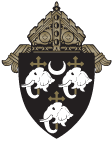All of us have been inundated for the past several months with the ongoing
political campaigns. There has also been a lot of talk about freedom of religion. One of the ways we support freedom of religion is by exercising our right to vote. As Catholics, we have a challenge to, first of all, be good citizens by exercising our right and duty to vote.
As Catholic Christians, we have by our baptism received God’s life within us, an intimate relationship with Jesus. By our becoming Church, we are united to Jesus and our sisters and brothers.
We are called, as a result of our baptism, to live out our faith. But our faith is not limited to just being in Church. We are expected to live our faith in everyday life in the world. By voting, and especially by voting with an informed conscience, we exercise one of the ways in which we live out our faith.
There is no “Catholic” party, nor an endorsed candidate by the Church. But there are moral issues that are involved in elections.
Among the issues that we face in the current election are the sanctity of human life; the inherent dignity of every human being; issues of justice, both social and economic; war and peace; care for the poor and public ethics.
The Church, through the Holy Father and the National Conference of Catholic Bishops, has spoken often about all of these issues.
Our country’s own foundational document, the Declaration of Independence, acknowledges all persons “are endowed by their Creator with certain inalienable rights, that among these are life, liberty and the pursuit of happiness.”
Certainly, the gift of life is a fundamental moral truth and a right expressed by the Founding Fathers.
The Gospel teachings are very clear on so many of these issues. In Mathew 25, Jesus says whatsoever you do to the least of my brothers and sisters, you do unto Me. The human dignity of every person, whatever their race, religion, place of origin or nationality is fundamental to the reality that we are all God’s children, that we have all been redeemed by the Passion, death and resurrection of Jesus.
There is no party or platform that perfectly embodies all Catholic moral principles. We have to recognize what are our foundational moral principles and discern who will most support those fundamental moral principles. To exercise the right and duty to vote requires that we be well informed and that we pray seriously about our choices.
We are part of a world which has changed a great deal. As I mentioned in my last column in the Catholic Star Herald, there is a crisis of faith. Religion does get shunted off to a private and hidden place as far as society is concerned. However, in a healthy society, moral principles, faith and trust in God and a respect of God’s sovereignty over us all can never be ignored or shunted aside.
The Church does not tell us who to vote for. But the Church presents to us those fundamental principles which we should be concerned about when we vote. Those principles are the sanctity of life, the inherent dignity and worth of every human being, economic and social justice, and care for our neighbors, especially the poor among us
So, my dear friends, I ask you to pray daily for our country, which we love, to ask God’s grace and help to all those who seek to lead. But I ask as well that we, who are the Church, take seriously our responsibility to be a healing and holy leaven in our society.
